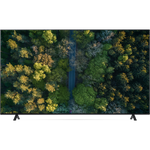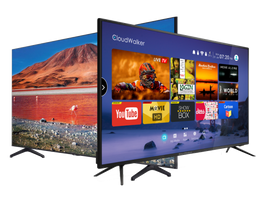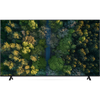A comparison of specs, key information, reviews, and best pricing from top retailers
Last updated -- hours ago | Report incorrect information
What we think

The PerfectRec TV team Learn more
Updated January 10, 2024·
If you're looking for a TV with better performance in a bright room, the Sony X77L has a slight edge. However, if you enjoy watching sports, the LG NANO75 offers a better experience. For gaming, the Sony X77L again takes the lead, providing a more responsive feel due to its lower input lag and faster response time. For dark room viewing, neither TV is particularly strong, but the Sony's slightly better contrast may make it a marginally better choice. Both TVs have similar sound quality. The Sony X77L is often somewhat less expensive, offering a better value proposition if you're looking to save a bit without compromising too much on quality. Give Feedback
this description is based on the product variant with some specs and product variant with some specs. At the time of writing, the variant with some specs cost some dollars and the variant with some specs cost some dollars.
Advantages of the LG NANO75 (LCD)
- Good reflections
Advantages of the Sony X77L (LCD)
- Very good motion processing
- Good viewing angle
Key differences
Cost
$480


$448
$200
$300
$400
$500
$600
$700
The LG NANO75 (LCD) has a price of $480 and the Sony X77L (LCD) costs $448.

Let Us Help Find Your Perfect TV
Find your new TV
Key similarities
Picture Quality
5.6


5.6
4.97/10
CONTRAST
3.58/10
5.8/10
COLOR VOLUME SCORE
6.3/10
LED
PANEL TYPE
LED
IPS
PANEL SUB-TYPE
IPS
The LG NANO75 (LCD) and Sony X77L (LCD) both have poor picture quality.
Movies & TV
5.2


5.2
4.97/10
CONTRAST
3.58/10
5.0/10
BLACK UNIFORMITY
5.8/10
7.5/10
UPSCALING
7.0/10
Yes
HDR10 SUPPORT
Yes
No
HDR10+ SUPPORT
No
No
DOLBY VISION SUPPORT
No
The LG NANO75 (LCD) and Sony X77L (LCD) are both poor for movies & TV.
The LG NANO75 and the Sony X77L both have issues that make them less ideal for watching movies and cinematic TV: the LG NANO75 struggles with lower contrast and poor black uniformity, which can lead to washed-out dark scenes, while the Sony X77L also has low contrast and has slightly better black uniformity, yet it still falls short in delivering deep blacks that are essential for a good movie-watching experience. Additionally, both TVs lack local dimming which is crucial for improving contrast in different scenes and their IPS screens inherently offer wider viewing angles at the expense of contrast, which is very important for cinematic content.
Sports
6.7


6.8
7.5/10
MOTION PROCESSING
8.5/10
60Hz
REFRESH RATE
60Hz
10.0/10
INPUT LAG SCORE
8.7/10
7.5/10
UPSCALING
7.0/10
5.8/10
SDR BRIGHTNESS SCORE
7.2/10
Yes
HLG SUPPORT
Yes
The Sony X77L (LCD) and LG NANO75 (LCD) are both only fair for sports.
The LG NANO75 offers fair motion processing and response time for sports viewing, which means that while there may be some motion blur during fast scenes, it's generally well-handled. On the other hand, the Sony X77L also provides fair response time and slightly better motion processing, reducing motion blur, but similar to the LG, reflections may still be noticeable and viewing angles are just adequate, not exceptional. Both TVs have decent gray uniformity which is important for displaying an even field during sports but isn't the top tier.
Gaming
5.7


5.8
6.1/10
RESPONSE TIME SCORE
5.9/10
10.0/10
INPUT LAG SCORE
8.7/10
7.5/10
MOTION PROCESSING
8.5/10
0.0/100
GAMING LOCAL DIMMING
5.0/100
5.7/10
GAME HDR BRIGHTNESS SCORE
6.4/10
The Sony X77L (LCD) and LG NANO75 (LCD) are both poor for gaming.
The LG NANO75 is considered poor for gaming due to its fair response time, though it has excellent input lag, which is beneficial for gaming. Both TVs have their strengths in input lag, but the slow response times can detract from the gaming experience by causing motion blur or ghosting effects in fast-paced scenes.
Cartoons & Animation
5.9


6.0
6.5/10
COLOR GAMUT SCORE
5.9/10
5.8/10
COLOR VOLUME SCORE
6.3/10
5.8/10
SDR BRIGHTNESS SCORE
7.2/10
7.7/10
COLORS OUT OF THE BOX SCORE
8.8/10
6.0/10
GRAY UNIFORMITY
7.7/10
Although they have very similar scores, PerfectRec considers Sony X77L (LCD) to be only fair for cartoons & animation, while the LG NANO75 (LCD) is poor.
The LG NANO75 displays colors out of the box well but has a limited color gamut making it less ideal for vibrant cartoon and animation colors, while the Sony X77L provides excellent colors out of the box with a similarly poor color gamut, yet still manages a fair overall showing for those types of content.
News, Talk, & Other TV
6.1


6.0
5.8/10
SDR BRIGHTNESS SCORE
7.2/10
7.5/10
UPSCALING
7.0/10
The LG NANO75 (LCD) and Sony X77L (LCD) are both only fair for news, talk, & other TV.
The LG NANO75 and the Sony X77L both provide a fair experience for watching news and TV programs, with the LG offering slightly better upscaling for low-resolution content and better colors straight out of the box, whereas the Sony has better SDR brightness for handling most lighting conditions but doesn't perform as well in color gamut, impacting the range of colors displayed.
Bright Room
5.8


6.0
6.8/10
VIEWING ANGLE
7.7/10
5.8/10
SDR BRIGHTNESS SCORE
7.2/10
5.5/10
HDR BRIGHTNESS SCORE
6.2/10
7.8/10
REFLECTIONS SCORE
6.3/10
Although they have very similar scores, PerfectRec considers Sony X77L (LCD) to be only fair for bright room, while the LG NANO75 (LCD) is poor.
The LG NANO75 has a lower SDR and HDR brightness, making it less suitable for use in bright rooms compared to the Sony X77L, which has a higher rating for these qualities. Although both TVs handle reflections only fairly well, the higher brightness of the Sony X77L can help mitigate the impact of glare, providing a better viewing experience in well-lit environments.
Give feedback
We’re constantly working to improve.
How the LG NANO75 (LCD) and the Sony X77L (LCD) compare to other TVs
Spec Comparison
| LG NANO75 (LCD) | Sony X77L (LCD) |
GENERAL | |||
|---|---|---|---|
| Price | |||
$480 | $448 | ||
Brand | |||
Brand | LG | Sony | |
Release Date | |||
Release Date | March 1, 2022 | July 1, 2023 | |
Full name | |||
Full name | 43NANO75 | KD-43X77L | |
Screen Size | |||
Screen Size | 43" | 43" | |
Screen Resolution | |||
Screen Resolution | 4K | 4K | |
TV FEATURES | |||
|---|---|---|---|
Operating System | |||
Operating System | webOS | Google TV | |
Sound Quality Score | |||
Sound Quality Score | 6.1/10 | 6.1/10 | |
NextGen Ready | |||
NextGen Ready | No | No | |
HDMI Ports | |||
HDMI Ports | 3 | 3 | |
Coax Ports | |||
Coax Ports | 1 | 1 | |
DISPLAY QUALITY SCORES | |||
|---|---|---|---|
Picture Quality Score | |||
Picture Quality Score | 5.7/10 | 5.6/10 | |
Bright Room Score | |||
Bright Room Score | 5.8/10 | 6/10 | |
Gaming Score | |||
Gaming Score | 5.7/10 | 5.8/10 | |
Movies & TV Score | |||
Movies & TV Score | 5.3/10 | 5.2/10 | |
Sports Score | |||
Sports Score | 6.7/10 | 6.9/10 | |
PHYSICAL | |||
|---|---|---|---|
Dimensions w/o Stand (H x W x D) | |||
Dimensions w/o Stand (H x W x D) | 22.2" x 38.1" x 2.3" | 22.4" x 38.4" x 2.9" | |
Dimensions with Stand (H x W) | |||
Dimensions with Stand (H x W) | 24.5" x 38.1" | 25" x 38.4" | |
Weight without Stand | |||
Weight without Stand | 20.3 lbs | 20.5 lbs | |
VESA Mount | |||
VESA Mount | 200 x 200 | 200 x 200 | |
DISPLAY | |||
|---|---|---|---|
Color Depth | |||
Color Depth | 10 bit | 10 bit | |
Black Frame Insertion | |||
Black Frame Insertion | No | Yes | |
Auto Low Latency Mode | |||
Auto Low Latency Mode | Yes | Yes | |
Contrast | |||
Contrast | 5/10 | 3.6/10 | |
Local Dimming | |||
Local Dimming | 2.5/10 | 3/10 | |
SOUND | |||
|---|---|---|---|
Speaker Setup | |||
Speaker Setup | 2.0 | 2.0 | |
Speaker Power | |||
Speaker Power | 20 W | 20 W | |
Dolby Atmos | |||
Dolby Atmos | Yes | Yes | |
DTS:X | |||
DTS:X | No | Up to DTS Digital Surround, Bypass only | |
Shopping
Sony X77L (LCD)
See more
Dig into reviews and images
HDTVs and more
Milton Clark | September 2023
"For an entry-level model, Sony’s X77L is a decent 4K TV. It’s color reproduction, along with crisp and clean picture images revealed plenty of detail and clarity thanks in part to Sony’s excellent video processing."
Get a great deal on the LG NANO75 (LCD) or the Sony X77L (LCD)
About LG
LG, a prominent TV brand from Korea, has played a significant role in popularizing OLED TVs. OLED technology is hailed as the future of TV technology. Their TVs employ WebOS, a proprietary smart TV software that not only offers seamless functionality but also includes gaming-specific features, earning praise from players worldwide. Often regarded as the gateway to unparalleled viewing experiences, LG's mid-range OLEDs come highly recommended, making them a worthwhile investment for those willing to stretch their budget for superior quality.
About Sony
Sony stands as a highly experienced and widely trusted TV manufacturer, earning a reputation that surpasses all others. A Japanese company, Sony has been making TVs for far longs than it has been making Playstation game consoles. Sony's high-end TVs are often regarded as the ultimate choice for videophiles, representing the epitome of quality, albeit at a premium price point. Renowned for their advanced and precise motion handling, as well as their cutting-edge local dimming algorithms, Sony consistently delivers unparalleled performance in these areas. They include Google TV software with all their TV sets, which grants access to the largest selection of apps available and they also include Bravia Core which is a movie streaming platform specifically for Sony TVs that offers higher picture quality by using more bandwidth.
Give feedback
We're constantly perfecting our model
TV guides you might be interested in
More comparisons for you
FAQs
FAQs about TVs
Why trust us
This information was produced and vetted by the PerfectRec TVs team. We are a product research and recommendation organization that meticulously reviews and evaluates the latest TV information and makes it digestible for you.
By the numbers
385
TVs evaluated
33,110
TVs stats compiled
21
Proprietary TVs ratings developed
121,530
Recommendations made
18,230
Consumer hours saved
About the TV team
Joe Golden, Ph.D
CEO and TVs Editor
Joe is an entrepreneur and lifelong electronics enthusiast with a Ph.D in Economics from the University of Michigan.
Jason Lew
Staff Expert & Software Engineer
Jason is a staff expert and software engineer that has been making laptop recommendations for 7 years and moderates one of the largest laptop subreddits.
Chandradeep Chowdhury
Staff Expert & Software Engineer
Chandradeep is a staff expert and software engineer and expert in televisions and monitors. He’s been making monitor recommendations for ten years.
Jaime Roldán
TVs Expert
Jaime is a Colombia-based TV expert. He is an electronics engineer with 8 years of experience in the telecom sector and has been making TV recommendations for 12 years.







